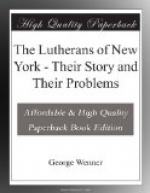At the beginning of the nineteenth century the use of German had sunk almost to zero. The minutes of the German Society had to be written in English because no one was sufficiently versed in German to write them in this language. There was nothing to interfere with the supremacy of English. Yet the English Lutheran church was unable to “propagate the faith of the fathers in the language of the children.” Down to the beginning of the twentieth century, the English churches were dependent for their growth upon accessions from the German and Scandinavian churches. They were unable to retain even the families they had inherited from their Dutch and German ancestors. We search in vain for descendants of the New York Lutherans of the eighteenth century in any of our churches.
Not until a new contribution of immigrants from Lutheran lands had been made to America did our church begin to rise to a position of influence.
When in the second quarter of the nineteenth century the first self-sustaining English Lutheran church was established, the Ockershausens and other children of immigrants were the strong pillars of its support. From that day to the present time not a single English Lutheran church has been established and maintained in this city where the Schierens, the Mollers and scores of others, immigrants or the children of immigrants, were not the chief supporters of the work. Without their effective aid the English Lutherans of the nineteenth century would have been swallowed up by “the denominations that are around us” as were their predecessors of the eighteenth century.
Some of our Anglo-American neighbors are concerned about our political welfare. They advise us to drop the German in order that we may become “Americanized.”
Many of us are the children of Germans who tilled the soil of America before there was a United States of America.
The Germans of the Mohawk Valley won at Oriskany, according to Washington, the first battle of importance in the American Revolution.* [Tr. note: original has no footnote to go with this asterisk]
The Germans of Pennsylvania, long a neutral colony on account of its large English population, obtained the right of suffrage in May, 1776, and turned the scale in favor of liberty. Through their vote Pennsylvania was brought by a narrow margin into line with Virginia and Massachusetts which would otherwise have remained separated and unable to make effective resistance against the armies of King George.
The Germans of Virginia followed their Lutheran pastor, Peter Muehlenberg, and made memorable the loyalty of American Lutherans. Steuben, the drillmaster of the Revolution, transformed the untrained and helpless troops of Washington into an effective force capable of meeting the seasoned soldiers of Cornwallis and Burgoyne.
Our German ancestors were peasants, unable to write history, but they helped to make history. Without their timely aid there would not have been a United States of America. Their children do not need to be “Americanized.” Nor have later immigrants from Germany and Scandinavia, at any period of our history, shown less loyalty to American ideals.




